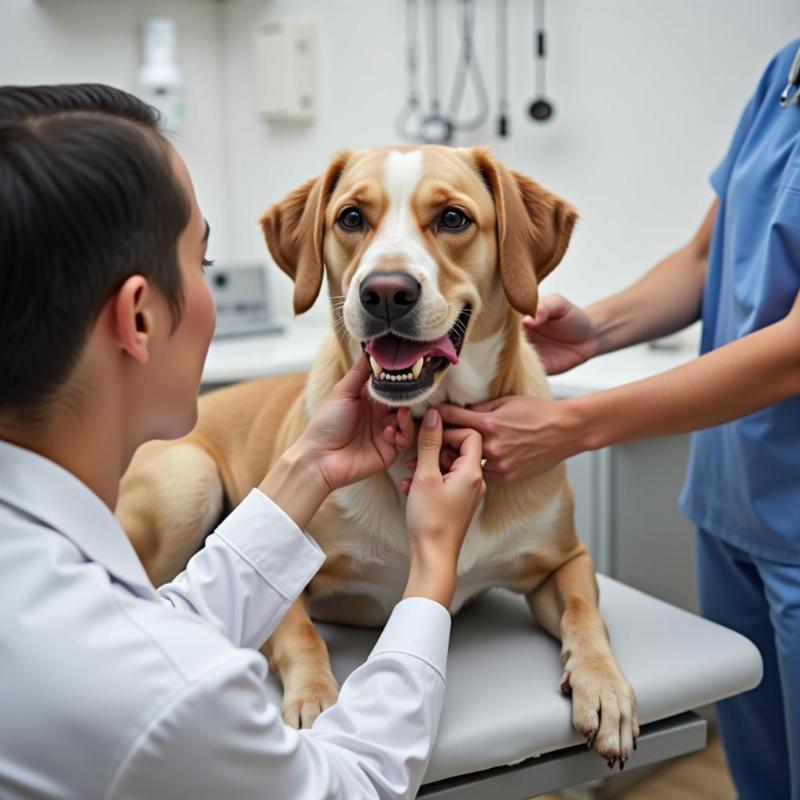Excessive lip licking in dogs can be puzzling. Is it a sign of hunger, thirst, or something more serious? Understanding why your dog won’t stop licking his lips is crucial for their well-being. This article will delve into the various reasons behind this behavior, offering insights and advice to help concerned dog owners in the US.
Decoding Your Dog’s Lip Licking: Common Causes
Lip licking is a natural canine behavior, often associated with anticipation of food. However, persistent licking can signal underlying issues. Let’s explore some common culprits:
- Nausea: Just like humans, dogs may lick their lips when feeling nauseous. This could be due to dietary indiscretion, car sickness, or even a more serious medical condition.
- Dental Issues: A painful tooth or gum infection can cause discomfort, leading to increased lip licking. Regular dental checkups are crucial for preventing and addressing these problems.
- Dry Mouth: Dehydration can lead to dry mouth, prompting your dog to lick their lips for moisture. Ensure your dog has access to fresh water at all times, especially during hot weather or after exercise.
- Stress or Anxiety: Lip licking can be a displacement behavior, a way for dogs to cope with stress or anxiety. Identifying and addressing the source of their anxiety is key.
- Allergies: Allergies to food, environmental allergens, or even certain materials can cause lip irritation and subsequent licking.
- Oral Foreign Bodies: Sometimes, a piece of food or a foreign object can become lodged in your dog’s mouth, causing irritation and licking.
When Lip Licking Becomes a Problem: Identifying Serious Concerns
While occasional lip licking is normal, excessive and persistent licking warrants veterinary attention. Here are some red flags to watch out for:
- Changes in Appetite or Drinking Habits: Accompanying changes in eating or drinking could indicate a more serious underlying issue.
- Vomiting or Diarrhea: These symptoms, coupled with lip licking, could suggest gastrointestinal problems.
- Lethargy or Weakness: If your dog seems unusually tired or weak, it’s important to seek veterinary care.
- Swelling or Redness Around the Mouth: These signs could point to an infection or injury.
What to Do if Your Dog Won’t Stop Licking Their Lips
If you’re concerned about your dog’s excessive lip licking, the first step is to consult with your veterinarian. They can perform a thorough examination to determine the underlying cause. Here’s what you can expect:
- Physical Exam: Your vet will examine your dog’s mouth, teeth, and gums for any abnormalities.
- Medical History: Providing your vet with a detailed history of your dog’s symptoms, including when the lip licking started and any other accompanying signs, is crucial.
- Diagnostic Tests: Depending on the suspected cause, your vet may recommend blood tests, urinalysis, or other diagnostic procedures.
 Chó khám sức khỏe tại phòng khám thú y
Chó khám sức khỏe tại phòng khám thú y
Preventing Excessive Lip Licking in Dogs
Proactive measures can help minimize the chances of excessive lip licking:
- Regular Dental Care: Brush your dog’s teeth regularly and provide dental chews to maintain good oral hygiene.
- Balanced Diet: Feed your dog a high-quality, balanced diet appropriate for their age and breed.
- Stress Management: Create a calm and enriching environment for your dog, minimizing stressors and providing plenty of opportunities for exercise and mental stimulation.
- Allergen Control: If your dog has allergies, work with your veterinarian to identify and manage them effectively.
Conclusion: Addressing Lip Licking for a Happy, Healthy Pup
Excessive lip licking in dogs can be a symptom of various underlying issues, ranging from minor discomfort to more serious medical conditions. By understanding the potential causes and seeking veterinary guidance when necessary, you can ensure your furry friend receives the appropriate care and enjoys a healthy, happy life. Remember, addressing the underlying cause is key to stopping the licking and ensuring your dog’s well-being.
FAQ:
- Q: Is lip licking always a sign of a problem? A: No, occasional lip licking is normal, but persistent licking could indicate an underlying issue.
- Q: When should I take my dog to the vet for lip licking? A: Consult your vet if the licking is excessive, accompanied by other symptoms, or if you’re concerned.
- Q: Can anxiety cause lip licking in dogs? A: Yes, lip licking can be a displacement behavior exhibited by anxious dogs.
- Q: How can I prevent my dog from licking their lips excessively? A: Maintain good oral hygiene, provide a balanced diet, manage stress, and control allergens.
- Q: What are some common treatments for excessive lip licking? A: Treatment depends on the underlying cause, which your veterinarian can diagnose and address.
- Q: Are certain breeds more prone to lip licking? A: While any breed can exhibit this behavior, some breeds might be more prone to certain conditions that cause lip licking.
- Q: Can medications cause lip licking in dogs? A: Yes, some medications can have side effects that include dry mouth or nausea, leading to increased lip licking.
Beautdogs.us: Your Trusted Source for Canine Care
Beautdogs.us is your premier destination for comprehensive dog care information, breed-specific advice, and product recommendations. We cater to both new and experienced dog owners, providing expert insights and practical tips to help you navigate the joys and challenges of dog ownership. Contact us today for personalized advice and support! Email: [email protected], Phone: +1 501-555-7529.